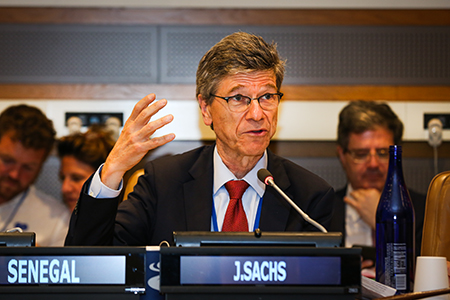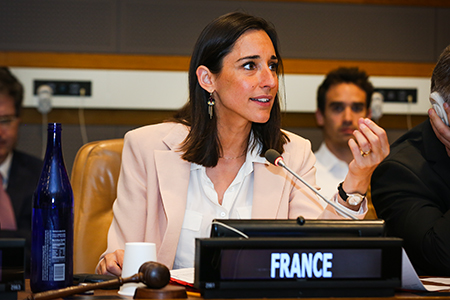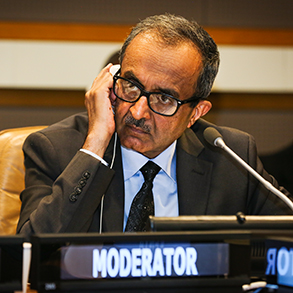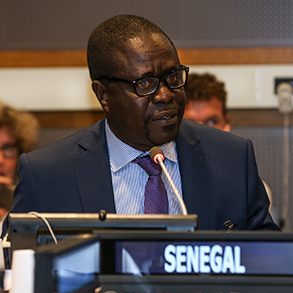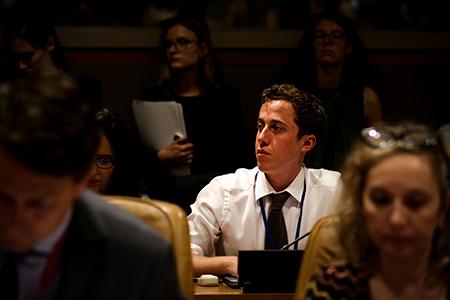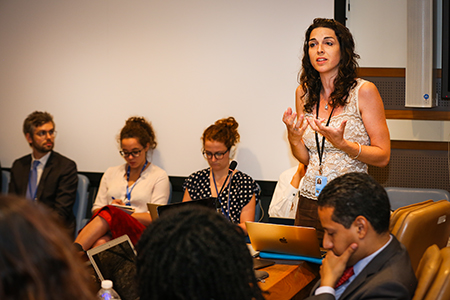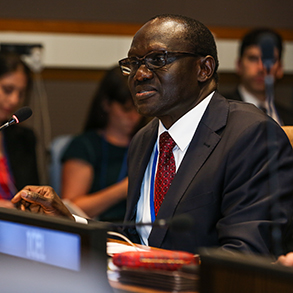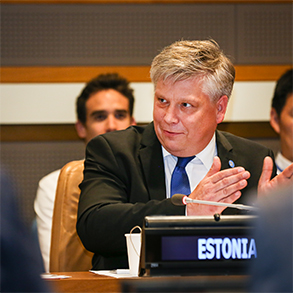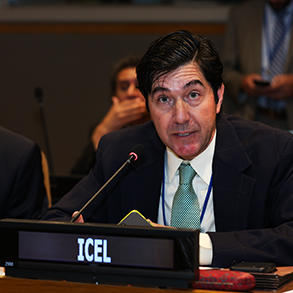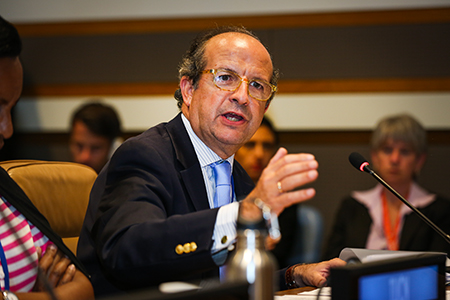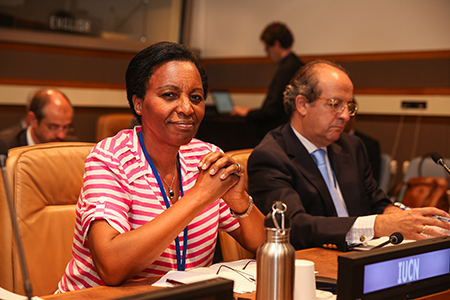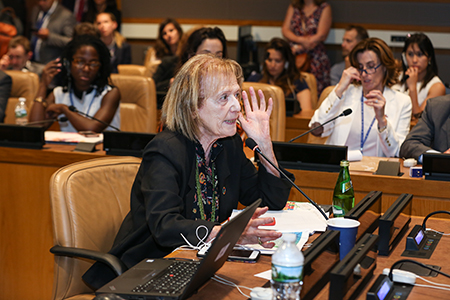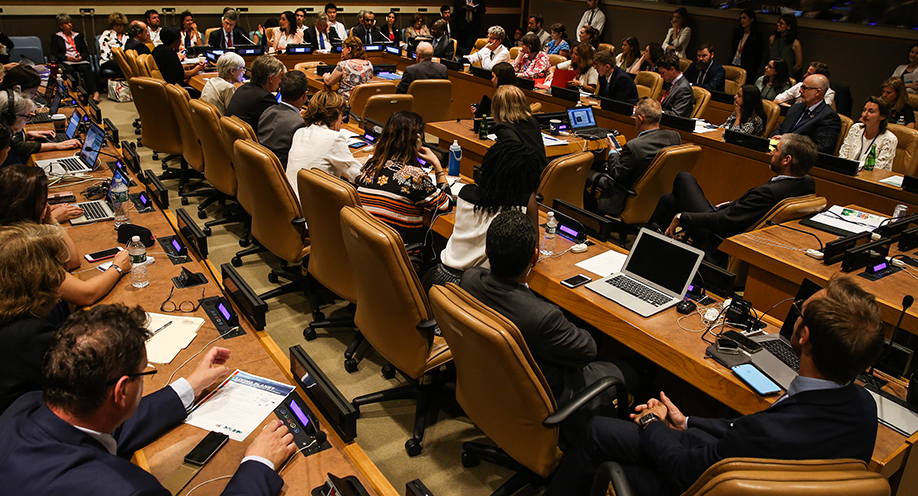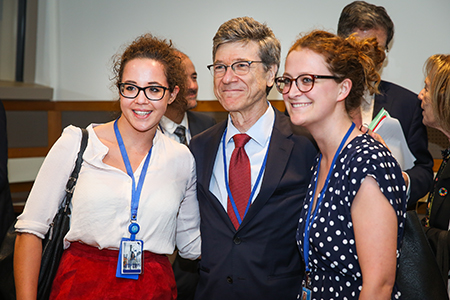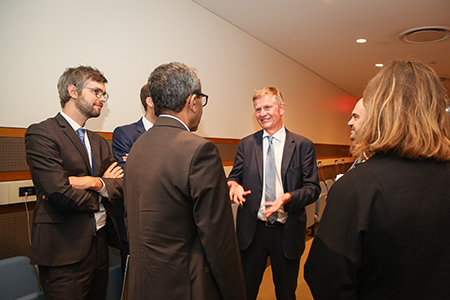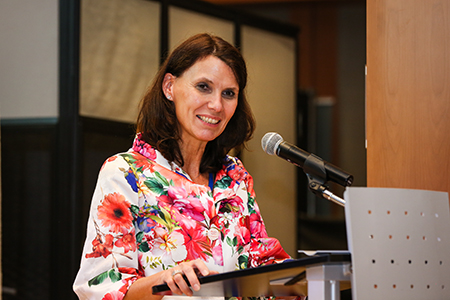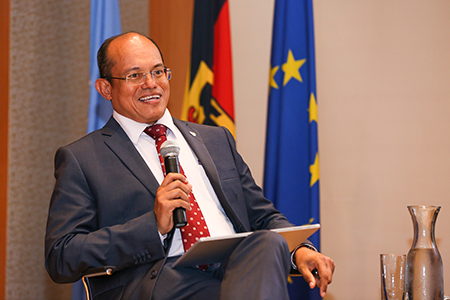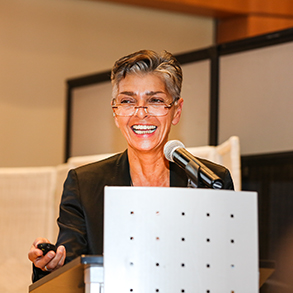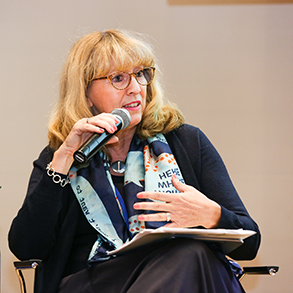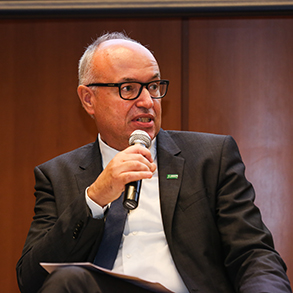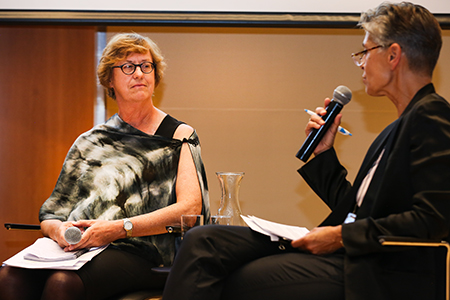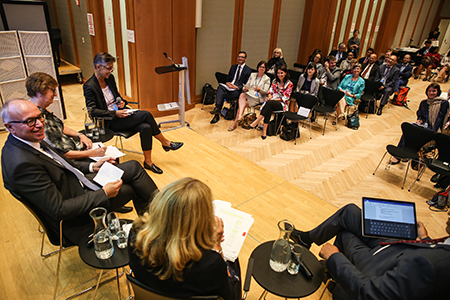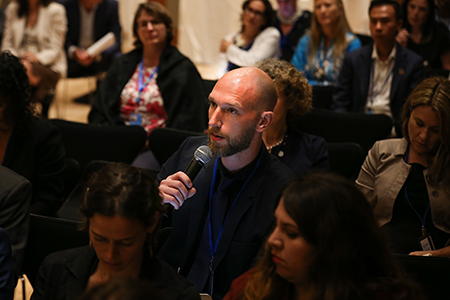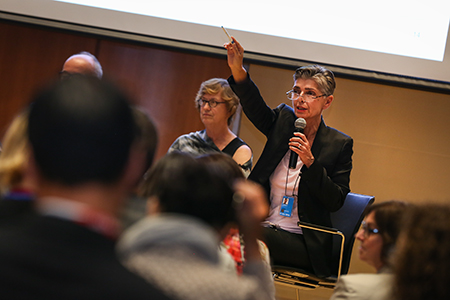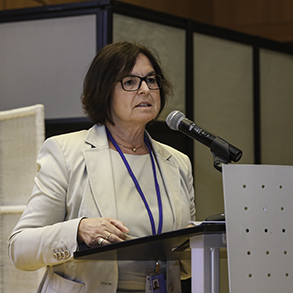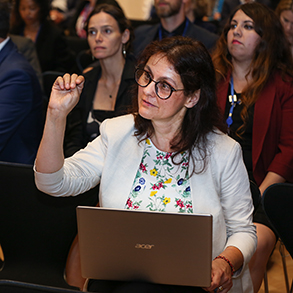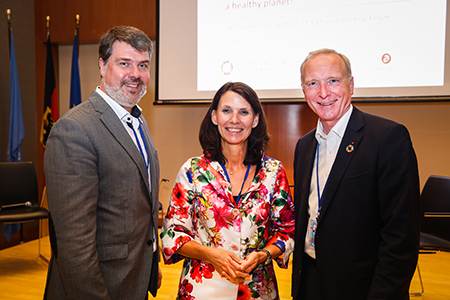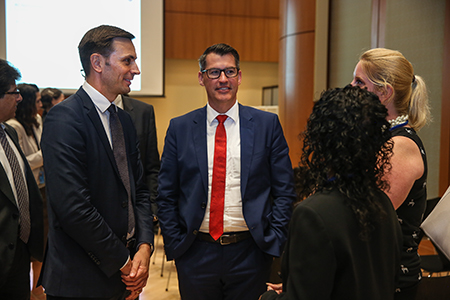Summary
The following events were covered by IISD Reporting Services on Tuesday, 17 July, 2018:
- Global Pact for the Environment: A Tool in Implementing the 2030 Agenda
- Meeting the Challenge of Chemical Pollution beyond 2020: Working Together for Healthy People and a Healthy Planet!
Photos by IISD/ENB | Natalia Mroz
For photo reprint permissions, please follow instructions at our Attribution Regulations for Meeting Photo Usage Page
Global Pact for the Environment: A Tool in Implementing the 2030 Agenda Presented by the Permanent Mission of France to the UN
This event convened to demonstrate that the Global Pact for the Environment (Global Pact) can be a tool for all countries to implement the 2030 Agenda for Sustainable Development (2030 Agenda) by strengthening international environmental law and facilitating the implementation of the environmental pillars of sustainable development.
Moderator Jamil Ahmad, Director, UN Environment (UNEP), opened the event, noting it provides an important milestone for moving the Global Pact forward.
Brune Poirson, Minister, Ecological and Inclusive Transition, France, stressed: accelerating collective and concrete actions against "widespread and catastrophic loss of biodiversity,” and said the Global Pact aims to bring together fundamental principles of environmental law in a single, short, and cross-cutting text, noting international environmental law remains fragmented. She explained the UN General Assembly resolution (A/72/L.51) decided to establish an ad hoc open-ended working group to identify gaps in international environmental law and make recommendations by June 2019.
On implementation of the 2030 Agenda, the panelists addressed: impacts of current international law; what content in the Global Pact would be most useful; and how to ensure greater stakeholder participation and engagement.
Victor Tafur, International Council of Environmental Law (ICEL), and Representative to the Economic and Social Council (ECOSOC), said the incomplete and fragmented nature of current international law will retard implementation of the Sustainable Development Goals (SDGs). On a set of global principles, he said: states can guide implementation; principles apply directly once recognized and need neither bureaucracy nor a budget; and principles will help level the playing field among states.
Siim Valmar Kiisler, Minister of Environment, Estonia, and President, UN Environment Assembly (UNEA), observed, as a minister, that countries track what commitments have been made by their neighbors, and clearer understanding in this regard would help national legislative bodies. He said UNEA’s role would be more on the practical vs. legal aspects of the Global Pact, and he looked forward to future clarification about the linkage with UNEA.
Erik Solheim, Executive Director, UNEP, lauded France for its recent environmental initiatives, saying political leadership is a “raw material” more needed and valuable than gold. He outlined UNEP’s role as one of service, highlighting an upcoming gap analysis that will provide information about the need for and potential benefits of the Global Pact.
On potential ways to ensure usefulness in implementing the 2030 Agenda, Mame Thierno Dieng, Minister of Environment and Sustainable Development, Senegal, stressed opportunities to strengthen actions to implement the 2030 Agenda at various levels. He emphasized: the principles of transparency, participation, and inclusion; and partnerships to mobilize everyone.
Minister Poirson underscored the need to act together to address environmental degradations that affect vulnerable groups, including youth, women, and marginalized and indigenous groups, and said the Global Pact is an important tool for addressing this issue in partnerships and in solidarity.
Daniel Calleja y Crespo, Director-General for Environment, European Commission, outlined the Global Pact aims to: offer a coherent legal framework; create a cornerstone for more far-reaching norms; complement other environmental law by codifying certain principles; foster legislative and jurisdictional mechanisms to ensure monitoring and implementation; and increase legal certainty.
On ensuring greater stakeholder participation and ownership, Lazarus Amayo, Permanent Representative of Kenya to the UN, said the Global Pact process needs to: ensure strong leadership and high-level commitments on the 2030 Agenda: involve countries that might not have voted for the resolution to move forward together to achieve the SDGs; and engage non-state actors, such as NGOs, the private sector, academia, and youth.
Cyriaque Sendashonga, International Union for Conservation of Nature (IUCN), noted IUCN’s involvement in creating the opportunity for non-state actors to be involved. She said IUCN fully supports the resolution as it: ensures multi-stakeholder participation; contributes to achieving the 2030 Agenda; and accelerates actions of IUCN member states.
During a discussion period, participants commented on: language establishing the right to a healthy environment; support for the Global Pact from the private sector, and local and regional governments; lack of uniform regulations on methane pollution; the need for conversations at the national level to assess domestic implications; and taking into account traditional knowledge, and the rights of indigenous peoples and women.
Jeffrey Sachs, Special Advisor to the UN Secretary-General, and Director, Sustainable Development Solutions Network (SDSN), outlined key principles in the Global Pact and identified two challenges it can help to advance: climate change, saying it is not a risk of the future, but a clear and present danger, and that a system of remediation could help by providing funds for restitution, especially for poor people; and global supply chains, calling for globalized co-responsibility, where both downstream users and upstream generators are held responsible for environmental impacts.
Minister Poirson said the Global Pact process offers a momentum for collective actions to progress together quickly, and closed the event, saying, “you can count on France to tackle this global struggle.”
Jeffrey Sachs, Special Advisor to the UN Secretary-General, said emergency response, in the context of climate-related natural disasters, is not a system; it leaves behind an unsolved catastrophe.
Minister Brune Poirson, France, emphasized strong political response is crucial for addressing the challenges of sustainable development
Moderator Jamil Ahmad, UN Environment, listens to a presentation
Erik Solheim, Executive Director, UN Environment, thanked countries who remained open to the Global Pact if the UN began a formal process, even though they initially voted against the UNGA resolution.
Mame Thierno Dieng, Minister of Environment and Sustainable Development, Senegal, said his country supports the Global Pact because it will provide benefits to human beings, animals, and the planet
A participant listens to the discussion
A participant applauded the Global Pact’s emphasis on health, saying pollution is the largest cause of death on the planet
Lazarus Amayo, Permanent Representative of Kenya to the UN, said his country continues to support whatever makes change possible
Siim Valmar Kiisler, Minister of Environment, Estonia, and President, UNEA, said the entire international community should be invited to help determine how the Global Pact can most contribute to implementation of the 2030 Agenda
Victor Tafur, ICEL, said national governments will decide how to apply the principles included in the Global Pact
Daniel Calleja y Crespo, Director-General for Environment, EC, called the Global Pact a ground-breaking initiative that will facilitate implementation of the SDGs and environmental legislation in a holistic manner
Cyrie Sendashonga, IUCN, said IUCN involvement in the process has brought multi-stakeholder participation
Participants take a photo before the session
A participant poses a question
The room during the session
Jeffrey Sachs, Special Advisor to the UN Secretary-General, takes a picture with participants
Erik Solheim, Executive Director, UN Environment, greets participants
Contact:
More Information:
Meeting the Challenge of Chemical Pollution beyond 2020: Working Together for Healthy People and a Healthy Planet!
Presented by the Federal Ministry for the Environment, Nature Conservation and Nuclear Safety (BMU), Germany
This event provided a platform for participants to exchange perspectives on chemicals and waste, including challenges and opportunities for sound management, in the context of SDG 12 on sustainable consumption and production patterns.
Moderator Minu Hemmati, Adelphi, called addressing chemicals a key enabler for achieving SDG 12. Noting that asbestos kills more than 100,000 people each year, and that up to 22 million people can be at risk from exposure to lead-acid car battery recycling, she called for: raising awareness on chemical and waste issues; better risk management; and adequate global governance.
Rita Schwarzelühr-Sutter, Parliamentary State Secretary, BMU, Germany, stressed her country’s ambitious, practical framework on waste management to achieve the 2030 Agenda and circular economy. She underscored: clearly demonstrating the benefits of addressing chemicals to realize the SDGs nationally and globally; and promoting international cooperation to share experiences and mobilize support.
Karolina Skog, Minister of Environment, Sweden, called for consumers to make more responsible choices. She outlined her country’s international high-level alliance on chemicals and waste, launched at the HLPF, which intends to mobilize public interest on chemicals and waste beyond 2020. Skog underscored the need to reform the chemicals management system, including regulations on: trade and e-commerce; international cooperation to deliver global action on SDG 12; development of natural chemicals: and capacity building.
During the panel discussion, Rolph Payet, Executive Secretary, Basel, Rotterdam, and Stockholm Conventions, addressed the issue of legally binding conventions and voluntary approaches. He said countries agree these three conventions provide a legally-binding approach, while the voluntary, multi-stakeholder and multi-sectoral Strategic Approach to International Chemicals Management (SAICM) deals with issues not covered under the conventions.
He also noted illegal trade in chemicals, and the need for proper exchange of information between countries, citing examples where the global availability or use of a specific chemical exceeds its known legal production.
On the circular econmy of chemicals, Astrid Schomaker, European Commission, said that increasing complexity in the supply chain makes control more difficult, and noted the need to keep the product in the chain as long as possible, which may be at odds with industry’s effort to take it out. She also highlighted: building on high public awareness; strict EU chemical management legislation requiring information sharing with authorities; and constructive industry partners.
On challenges for the industry, Martin Kayser, BASF SE, emphasized: ongoing efforts for sound chemicals management; gaps in knowledge and practice between developed and developing countries; and his company’s development of a responsible care management system, including workshops to build capacity in safe transportation, storage and handling of chemicals. He noted SAICM’s success in bringing stakeholders together and expressed support for its continuation.
Susan Wilburn, Health Care Without Harm, noted the need to: identify consumption patterns of chemical products in procurement and patterns during use and disposal; and demonstrate possible solutions related to the SDGs. Stressing the importance of making information about safe or toxic chemicals available to consumers, she called for ensuring the distribution chain includes alternative, safer chemicals.
In ensuing discussion, panelists discussed, inter alia: regulatory vs. voluntary frameworks on chemical management at different levels; making use of existing platforms such as the Rotterdam Convention on the Prior Informed Consent; ensuring chemical data is available to governments and consumers; how to prevent toxic chemicals from being included in recycled products while pursuing a circular economy; transparency; engagement with the health sector; and the role of the private sector.
Gertrud Sahler, President, Fifth International Conference on Chemicals Management (ICCM), Germany, said addressing the chemicals and waste cluster is a requirement for sustainability policy at global and national levels. Saying we are likely to fall short of the SAICM 2020 Goal, which ends in 2020, she noted the 4th ICCM decision to implement an intersessional process on chemicals and waste management beyond 2020. She emphasized: maintaining a voluntary, multi-stakeholder and multi-sectoral approach; stronger involvement of industry; addressing capacity needs in developing countries for chemicals management; more recognition of the issue in other UN processes, such UN Food and Agriculture Organization, World Health Organization and UN Development Programme; and inadequate financing. She highlighted the 2019 meeting of the Open-ended Working Group as a starting point for negotiations on the issue.
In closing remarks, Jacob Duer, UN Environment (UNEP), noted agreement among diverse stakeholders in a number of areas, including on stepping up efforts. He cited concurrent work on SDGs and at other international processes. Recounting important political leadership and increased engagement of industry and civil society, he called for sharpening the narrative and acting together to address the sound management of chemicals and waste.
Minister Karolina Skog, Sweden, said we need to know what effect buying a product has on ourselves, the people surrounding us, and the environment
A participant takes a photo of the event
Rita Schwarzelühr-Sutter, Parliamentary State Secretary, Germany, said her country is working with non-state actors to make “healthy people and healthy planet” a reality
Rolph Payet, Executive Secretary Basel, Rotterdam, and Stockholm Conventions, said illegal trade in chemicals affects companies’ business models
Moderator Minu Hemmati, Adelphi, posed questions to the panelists
Astrid Schomaker, Directorate General for the Environment, EC, emphasized maintaining the valuable components of the three chemicals conventions
Martin Kayser, BASF SE, said using chemicals safely is at the core of his business
Susan Wilburn, Health Care Without Harm, described a review of the UN procurement process for chemical products
Panelists interact with the audience
A participant taking notes
A participant poses a question
Moderator Minu Hemmati, collecting questions from the audience
A participant poses a question
In closing remarks, Jacob Duer, UNEP, said we need policies and frameworks so low and middle-income countries have the capacity to address sound chemical and waste management
Gertrud Sahler, President, 5th ICCM, and BMU, Germany, said addressing governance, structure and finances for chemicals management will remain challenging
Engagement during the Q&A session
Participants after the event
Contacts:
- Nils Simon
| simon@adelphi.de
